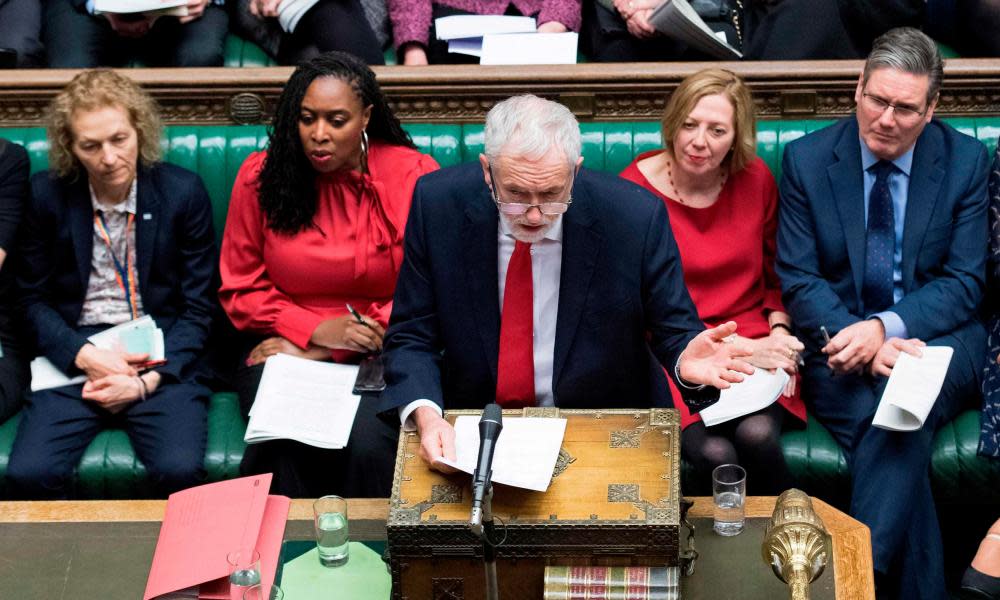Labour must pursue a better Brexit deal, not a second referendum

It is, perversely, a sign of the government’s weakness, not its strength, that it has inevitably seen off a vote of no confidence. All that unites a bitterly fractious Conservative party is panic at the prospect of a Jeremy Corbyn-led Labour government coming to power in a general election, a likelihood many are admirably honest about. If Theresa May was confident about the Tories’ prospects, she would risk throwing the dice. But Labour started the last election campaign 24 percentage points behind the Tories in the polls, and ended two points behind six weeks later. Today, the polling average has Labour slightly ahead. Conservatives fear that a Corbyn-led administration would not be like a “normal” Labour government, and would upend an economic consensus established by Margaret Thatcher. And they would be right.
The media will now attempt to shift the narrative, claiming that it is Labour under pressure. This is absurd. The government has just suffered the biggest parliamentary defeat in the history of British democracy. A disastrous near-decade of Tory rule has left Britain in its worst combined political and social crisis in modern times, the consequence of ideologically driven austerity and catastrophic political decisions by both David Cameron and May. Labour will be pilloried for not having a magical solution – when there is none – to a crisis engineered by its opponents.
There will be claims that, having lost this no-confidence attempt, Labour’s democratically agreed official policy dictates that it must now support a second referendum. But this is inaccurate. The policy states that the “best outcome for the country is an immediate general election that can sweep the Tories from power”, but if such an election cannot be engineered, the party “must support all options remaining on the table, including campaigning for a public vote”.
What is Labour’s strategy? Let’s take a second referendum. Whatever the leadership decides, it is not even clear that a majority can be found for it. One Labour MP – who resigned from the frontbench in 2016 – tells me that, in a free vote, “the parliamentary Labour party would be split down the middle, possibly [with] even more against. It’s just they aren’t the people on the telly all the time!” In the shadow cabinet, there are those, such as Diane Abbott (the single most influential Labour MP in Corbyn’s inner circle, a point neglected by most commentators for depressing reasons) and Keir Starmer, sympathetic to a second vote, with laudable reasons, too; others, such as Richard Burgon, against; and others, such as John McDonnell, pragmatically straddling the divide. Around 100 Labour MPs were predicted to declare in favour of a second referendum today; in the end, just 71 did so. If half of the parliamentary party voted for a second referendum, that would amount to less than a fifth of parliament; well over 100 Tory MPs would have to support it too. It is really difficult to see this happening, meaning that Labour would risk alienating its leave voters for nothing.
If Labour imposed a three-line whip in support of a referendum, shadow cabinet members representing leave constituencies have told me they will resign. If a referendum becomes the only option left, then Labour will have to campaign for remain, and make a great fist of it. But don’t have any illusions. The campaign will be even more bitter and vicious than the last; the culture war that has enveloped the country will get worse; millions of leave voters will be angered and even more disillusioned than before; and under a slogan of “tell them again”, leave may well win once more. Tory rule is the source of the nation’s ills: wishing to remove this Conservative government – and the only means of doing so is a Labour victory – is not putting “party before country”, it’s an attempt to save the nation from the most calamitous administration since the war. Of Labour’s 54 Tory-held target seats, 41 voted leave. Just 13 opted for remain. Without holding on to its existing leavers and winning over more, Labour cannot win an election, and the injustices that helped lead to the Brexit vote will be exacerbated.
So what does the party do? It must make a pitch to unite the country. The Tories have sought to represent only the leave side – and even then, not the bread-and-butter concerns of leave voters – and their key media supporters have demonised remainers. Labour must emphasise that the real conflict is not between supporters or opponents of Brexit, but the vast majority against the elite. It must refocus the debate on what unites both tribes, such as living standards, jobs, the NHS, taxing the rich and public ownership. That means advocating a compromise. A majority does exist in parliament for a customs union. And although many within the Labour leadership regard it as unsatisfactory, so-called Norway plus, combining the single market and a customs union, has a good chance of winning support across the parliamentary divide. The EU has made it clear that a shift in Britain’s red lines will open up new opportunities. That will refocus the debate on bitter Tory divisions, too.
Labour will be shouted down by a vocal lobby if it fails to back a second referendum. But, for now, the party must surely direct its efforts at constructing a new deal.
• Owen Jones is a Guardian columnist

 Yahoo News
Yahoo News 
